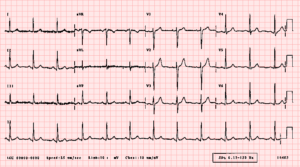What is an ECG – and what are they done?

A normal ECG.
An ECG (electrocardiogram) is a test that records the electrical activity of your heart; including the rate, rhythm and direction of electrical impulses. It’s quick and painless, and carries no risk.
Why is it done?
You will usually have an ECG (electrocardiogram) if a doctor (or health professional) thinks you are having symptoms of:
- Heart attack (myocardial infarction, MI)
- Angina – this is a cramp of the heart muscle that can a warning sign of a heart attack
- Arrthythmia – problems with how quickly or regularly your heart beats (arrhythmia) – e.g. atrial fibrillation (AF)
- Heart failure – looking for the cause
- Pericarditis – a heart inflammation.
You also may have an ECG
- Before an operation – to check you are well enough to have it
- Before and whilst taking certain medicines.
Preparing for an ECG (electrocardiogram)
There are some things you can do to help you prepare for an ECG (electrocardiogram), such as:
- Wearing a top that is easy to take on and off
- Not putting body lotions etc on your skin before the test
- Not eating a heavy meal or having caffeine before an exercise ECG (stress test)
Some men may also need to have their chest partly shaved and cleaned before the test.

